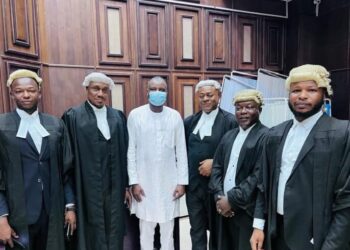By John Ikani
Central African Republic’s highest court has granted its approval to the results of a recent referendum.
The referendum revealed that an overwhelming 95 percent of voters endorsed alterations to the constitution.
The changes pave the way for President Faustin Archange Touadera to pursue a third term in office.
The modifications, which have faced sharp criticism from the opposition, involve the elimination of the country’s two-term limit for presidents.
Additionally, the presidential term duration will be extended from five to seven years.
Jean-Pierre Waboe, the president of the Constitutional Court, officially confirmed the outcomes of the constitutional referendum that took place on July 30 during a court session.
He stated, “The Constitutional Court validates and announces the definitive results of the constitutional referendum of July 30.”
Comparing the final results to the provisional figures disclosed by the National Election Authority on August 7, only minor adjustments were made.
The “Yes” vote was officially recorded as 95.03 percent, slightly lower than the earlier 95.27 percent.
Similarly, the voter turnout was revised to 57.23 percent, down from the previously announced 61.10 percent.
Despite the controversy surrounding these changes, the main opposition parties and civil society organizations had called for a boycott.
Central African Republic, one of the most underprivileged and turmoil-stricken nations globally, has been marred by conflict and political instability since gaining independence from France in 1960.
President Touadera, aged 66, initially assumed office in 2016. His election followed a period of French military intervention and subsequent deployment of UN peacekeepers, which put an end to a brutal civil war marked by sectarian divisions.
During the 2020 elections, Touadera secured a second term; however, voter participation was low, with only a third of the electorate turning out. This was due to the intimidation by rebel groups controlling significant portions of the nation.
In a significant turn of events last September, the Constitutional Court dealt a setback to the proposed constitutional amendments.
It dismissed the formation of a committee responsible for drafting the new constitution.
The decision led to vehement verbal attacks against the court’s president, Daniele Darlan, by supporters of President Touadera. Consequently, Darlan was compelled to retire involuntarily in January of the following year.




































